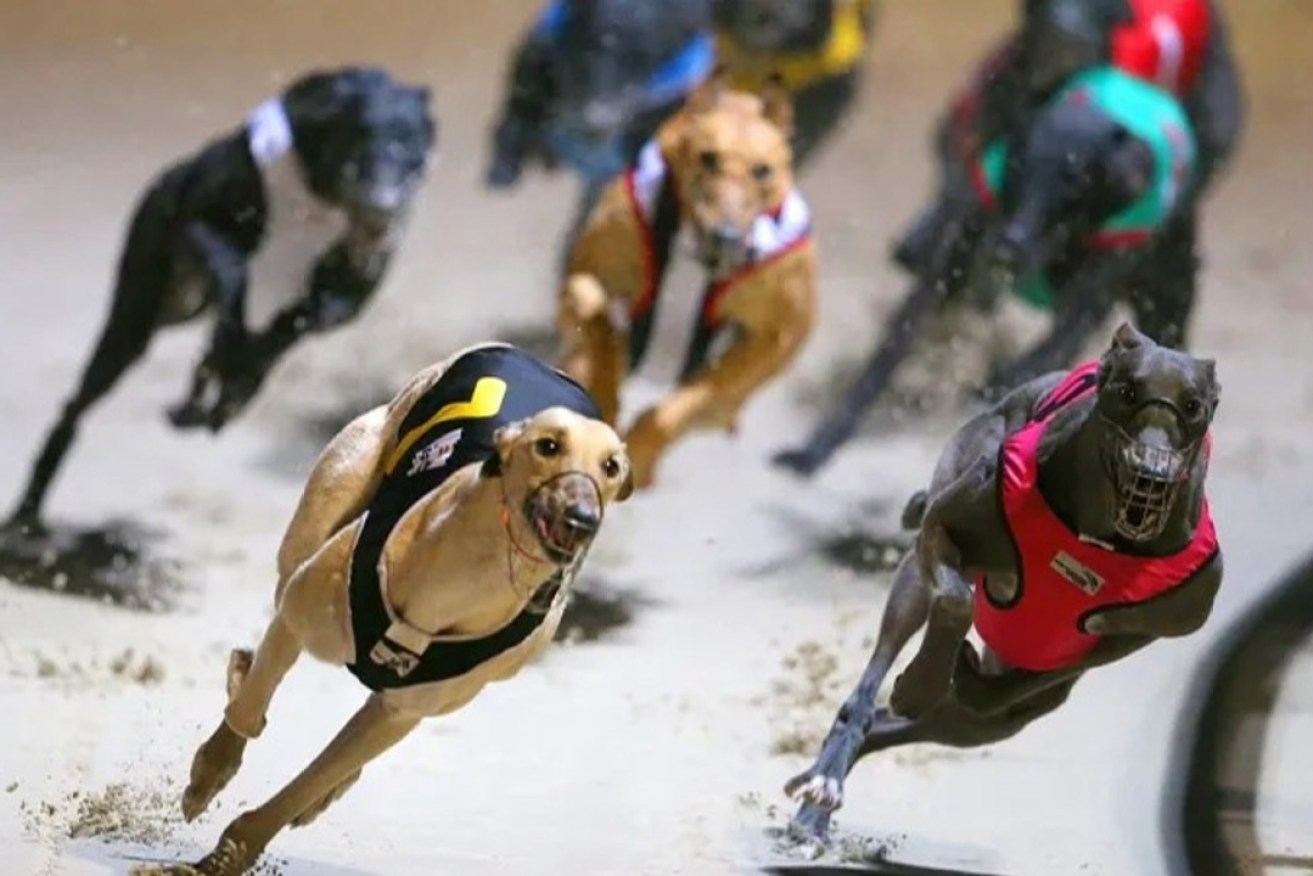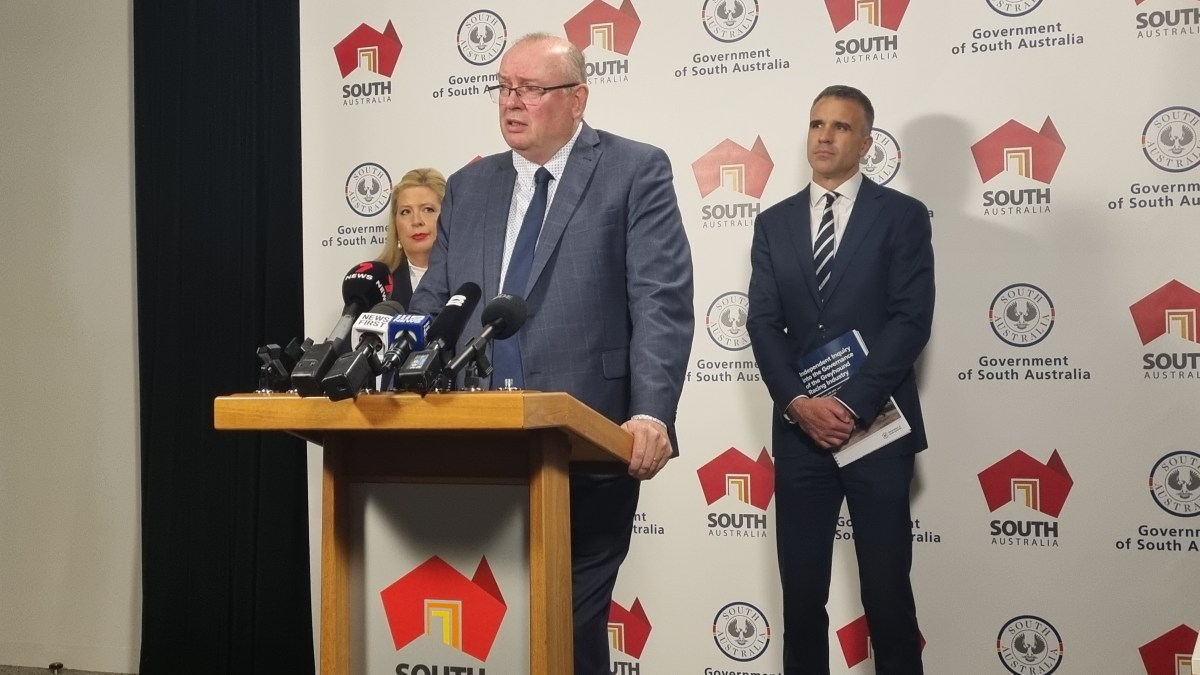Premier puts greyhound industry on tight leash
Greyhound racing has two years to “clean up its act” or face the risk of no longer operating in South Australia, after a damning report found the industry plagued by significant animal welfare and governance issues.


Photo: AAP
Former Victorian police commissioner Graham Ashton today released the findings of his independent inquiry into the operations, culture, governance and practices of South Australia’s greyhound racing industry.
The state government-commissioned inquiry was prompted by an ABC report in July which showed multiple greyhounds apparently being kicked and punched on a property southeast of Adelaide.
It also came shortly after three greyhound trainers were issued life bans for being involved in live baiting.
Ashton was tasked with examining if the current system of industry self-regulation inhibits the ability to prevent, investigate or respond to serious allegations of animal mistreatment.
His report makes 86 recommendations for change in the industry, including 10 that were sourced from the RSPCA and five from the Animal Justice Party.
Significantly, the report accepted a recommendation from the RSPCA which states: “Unless the significant, entrenched animal welfare problems inherent to the greyhound racing industry can be recognised and effectively resolved, this industry should not be supported.”
“It is the conclusion of this review that there is an urgent need for the greyhound racing industry in South Australia to reform if it is to meet contemporary community expectations,” the report states.
“These reforms are considerable and are dominated by greyhound welfare concerns including the sustainability of the GAP (Greyhounds as Pets) program.

Former Victorian Police Commissioner Graham Ashton alongside Premier Peter Malinauskas and Minister for Sport and Racing Katrine Hildyard at a press conference today. Photo: Thomas Kelsall/InDaily
“The industry generates significant funding which flows into the economy of the state and employees many people.
“If the sport is to retain a social license into the future, it will only be achieved if the reforms recommended in this report are immediate and widespread.”
The state government says it has accepted the 86 recommendations of the report “in principle”.
This includes the establishment of a “Greyhound Industry Reform Inspector” to monitor the industry’s progress in implementing the report’s recommendations over the next two years.
Ashton’s report recommends the inspector have “unfettered access” to Greyhound Racing SA’s systems and data.
The inspector will also report regularly to the Minister for Sport and Racing and produce a final report in two years “as to their level of satisfaction with the reform progress”.
“Animal welfare issues identified in this Review need to be urgently improved before government can be better assured that the industry should continue in its current form,” the report states.
“Only if this Inspector is satisfied after a period of two years that reforms have been achieved, would this Review recommend a long-term continuance of the industry with an oversight model considered best practice at that time.”
The state government expects to appoint the inspector around Easter next year.
Premier Peter Malinauskas said the report’s recommendations, if enacted, “will result in very substantial change into how the Greyhound Industry operates in South Australia”.
“This government wants to see the greyhound racing industry survive in South Australia – but only if it cleans up its act,” the Premier said.
“This report makes it plainly clear that there is work that needs to be done if the greyhound industry is going to continue in our state.”
Malinauskas said the recommendation for an inspector to oversee a two-year reform period “makes clear that this industry has two years to clean itself up”.
“Otherwise, it faces the prospect of no longer being able to enjoy the social license and the government support that is required for it to be able to operate,” he said.
Betting on greyhound racing provides significant taxation revenue to the state government. The betting operations tax, which covers all forms of racing, brought in an estimated $82 million to government coffers in 2022/23, according to the budget papers, and is expected to bring in $63 million this financial year.
The government also increased its support for racing at the last state budget by doubling the industry’s share of returns from the betting operations tax. The measure is expected to provide the industry $27.8 million over four years.
Asked today whether the government was really prepared to shut down greyhound racing, Malinauskas said: “Look the recommendation is clear, and I think we have a responsibility as a government to accept that recommendation.
“It would be an awful shame if this industry was no longer able to operate because a number of operators weren’t willing to clean up their act.
“But I’m optimistic. The reason why I say that is I think there are enough good people and good operators within the industry to see this change delivered.”
Asked if the government would consider introducing legislation to ban the greyhound racing industry, Malinauskas said: “Let’s not put the cart before the horse.
“We’ve got two years from the establishment of the inspector for (the industry) to start to demonstrate its capacity to implement many of these recommendations and get itself on a path of integrity and transparency and better animal welfare.
“But the industry operates under an act of parliament, so this is a perfectly legitimate role for government to monitor.”
In a statement a short time ago, Greyhound Racing SA said it “welcomes” the release of today’s report and agrees with its recommendations “in principle”.
The peak body said it has established a working group to review the report and “identify opportunities for immediate reform”.
“Elements of the report make for challenging reading, and we recognise the task we have been set,” the statement said.
“However, we welcome the challenge and are committed to working with our 1500 participants across South Australia to ensure we strengthen an industry that generates $112 million per annum in economic benefits for the state and supports the employment of more than 850 FTE jobs.”
The report found that 31 greyhounds died or had to be euthanised either on track or due to track injuries last financial year.
It was also critical of the greyhound industry for not implementing previous commitments and recommendations for reform.
This included a 2017 governance report commissioned by the industry and a commitment to reform made at a parliamentary committee inquiry in 2020.
Ashton said the inaction could be attributed to “simply a lack of oversight”.
“There’s been really a couple of key reform opportunities that have been missed,” he told reporters.
“Without someone having that direct oversight of the industry… it’s just been allowed to drag on.”
Ashton said some of the governance changes he has recommended were made in 2017 but have “not been fully implemented”.
He also said South Australia’s self-regulation model for greyhound racing was “out of step with what’s happening around the world”.
Asked if he was shocked by some of the behaviours uncovered during his inquiry, Ashton said: “There are some people that shouldn’t be in the industry in my view.
“Certainly, some of the practices that we learned about and GRSA were aware of trying to deal with were really quite alarming,” he said.
Ashton said the poor animal management practices related to poor nutrition, exercise and daylight exposure for greyhounds.
But the report did not find evidence of live baiting being prevalent, Ashton said.
The report adopted an RSPCA recommendation to implement “ongoing regulation and surveillance” for live baiting and other animal welfare offences.
The report further recommends new racetrack safety measures, such as more six dog races, more straight-track racing, and more use of double-arm lures which prevent dogs from bunching up on the track.
Animal Justice Party recommendations accepted by the report include enforcing a cap on greyhound breeding and actively pursuing prosecution for any and all breaches of the animal welfare act committed by the greyhound racing industry.
The full report is available here.




